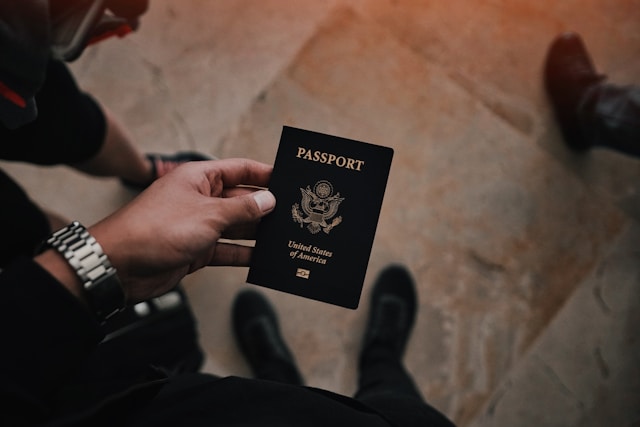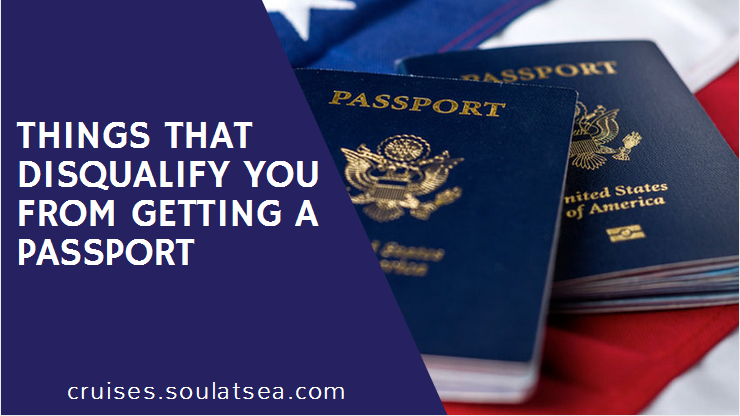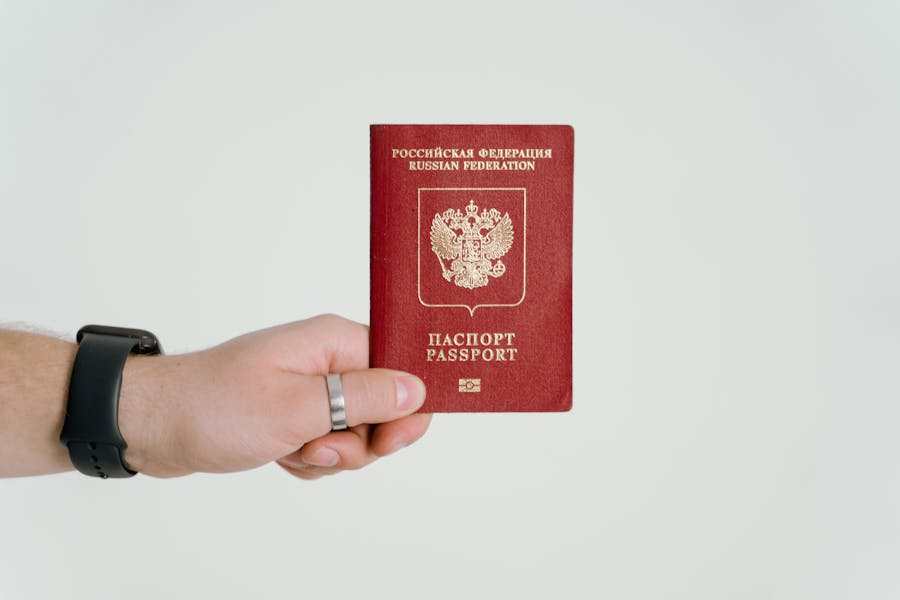Certain felony convictions can disqualify a person from obtaining a passport. This includes convictions related to drug trafficking, financial fraud, and human trafficking, as well as outstanding alimony or child support payments.
Additionally, if a person has a valid, unsealed federal warrant of arrest, a federal or state criminal court order, or is on parole or probation forbidding departure from the United States, they may also be denied a passport. However, most charged and accused felons who are not currently restricted from exiting the country can still get a passport without repercussions, according to the USA Federal Implication study.
It is important to check with the U. S. Department of State to determine if a felony conviction may impact passport eligibility.
Introduction To Passport Eligibility And Felonies
Certain felonies like drug trafficking, financial fraud, and human trafficking can disqualify individuals from obtaining a passport. Additionally, outstanding alimony or child support payments can also impact passport eligibility. It is essential to address these issues to ensure a smooth passport application process.
In the realm of passport eligibility, certain felonies can pose barriers to obtaining this vital travel document. Understanding the impact of felonies on passport rights is crucial for individuals navigating the passport application process.
The Passport Application Process
When applying for a passport, individuals must adhere to specific requirements and guidelines set forth by the issuing authority. This process involves submitting necessary documentation, completing the application accurately, and undergoing a background check to ensure eligibility.
Impact Of Felonies On Passport Rights
Felonies such as drug trafficking, financial fraud, and human trafficking can disqualify individuals from obtaining a passport. Additionally, outstanding alimony or child support payments can also impact passport eligibility. It is essential to address any felony convictions before applying for a passport to avoid potential disqualification.

Credit: thehappypassport.com
Specific Felonies Leading To Passport Denial
When it comes to obtaining a passport, certain felony convictions can lead to denial by the U.S. Department of State. These specific felonies include drug trafficking and international child abduction cases. Let’s take a closer look at each of these disqualifying offenses:
Drug Trafficking Convictions
Individuals convicted of drug trafficking offenses, whether at the federal or state level, are subject to passport denial. This applies to both domestic and international drug trafficking convictions. It is important to note that past drug-related offenses, even if they are no longer pending or under investigation, can still impact an individual’s passport eligibility.
International Child Abduction Cases
Another disqualifying felony is involvement in international child abduction cases. This includes situations where an individual is found to have unlawfully removed a child from the United States or retained a child outside of the country in violation of a court order or custody agreement. Such felony convictions can result in the denial of a passport application.
Understanding Federal And State Disqualifications
Federal Warrants And International Crimes
When it comes to obtaining a passport, individuals with certain felony convictions may face disqualifications at both the federal and state levels. At the federal level, a valid, unsealed federal warrant of arrest can lead to the denial of a passport. Additionally, individuals with federal or state criminal court orders or conditions of parole or probation forbidding departure from the United States may be ineligible for a passport.
State Felony Convictions And Passport Restrictions
State felony convictions can also result in passport restrictions. Some common felonies that disqualify individuals from getting a passport include drug trafficking, financial fraud, and human trafficking. It’s important to note that even if an individual regains eligibility for a passport, there is no guarantee that it will be granted, especially in cases involving drug trafficking or international child abduction.
Legal Implications For Traveling Abroad
When it comes to international travel, individuals with certain felony convictions may face restrictions on obtaining a passport and traveling overseas. It’s important to understand the legal implications and limitations related to probation, parole, and conditions of release for those with a criminal record.
Probation, Parole, And Travel Limitations
Individuals currently on probation or parole may encounter travel restrictions that can impact their ability to obtain a passport and travel internationally. A condition of probation or parole forbidding departure from the United States or the jurisdiction of the court can disqualify individuals from obtaining a passport.
Conditions Of Release And International Travel
Those who are subject to specific conditions of release, including travel restrictions imposed by the court, may face challenges when applying for a passport. Court orders related to international travel limitations can impact an individual’s ability to obtain the necessary travel documentation.
Countries With Entry Restrictions For Felons
Certain felonies that can disqualify you from getting a passport include drug trafficking, financial fraud, and human trafficking. Countries like Brazil, Cambodia, and Mexico may deny entry to felons upon discovery. It’s essential to check entry restrictions before planning international travel.
Common Destination Countries Denying Felon Entry
When it comes to international travel, individuals with a felony conviction may encounter entry restrictions in certain countries. It’s crucial to be aware of these limitations to avoid potential legal issues and travel disruptions. Several countries have stringent entry regulations for felons, and it’s essential to understand which destinations may deny entry based on criminal history.
Navigating International Travel Post-conviction
If you have a felony conviction and are planning to travel abroad, it’s important to research the entry requirements of your destination country. Some countries have strict policies regarding the entry of individuals with criminal records, and failure to comply with these regulations can result in denial of entry, deportation, or legal consequences. Navigating international travel post-conviction requires thorough preparation and understanding of the specific entry restrictions imposed by various countries.
When it comes to international travel, individuals with a felony conviction may encounter entry restrictions in certain countries. It’s crucial to be aware of these limitations to avoid potential legal issues and travel disruptions. Several countries have stringent entry regulations for felons, and it’s essential to understand which destinations may deny entry based on criminal history.

Credit: cruises.soulatsea.com
The Impact Of Financial Crimes On Passport Issuance
When it comes to obtaining a passport, individuals with certain felony convictions may face disqualification. Specifically, financial crimes can have a significant impact on passport eligibility. Understanding the implications of financial fraud and outstanding alimony or child support on the issuance of travel documents is crucial for individuals navigating the legal and administrative aspects of international travel.
Financial Fraud And Passport Eligibility
Financial fraud, such as embezzlement or money laundering, can result in the denial of a passport application. Individuals convicted of financial crimes may encounter challenges in obtaining a passport, especially if the offense involved substantial monetary losses or was linked to international criminal activities. It’s essential for individuals with a history of financial fraud to seek legal counsel and understand the potential limitations on their ability to obtain a passport.
Outstanding Alimony Or Child Support And Travel Documents
In cases where individuals have outstanding alimony or child support payments, their passport issuance may be impacted. Delinquent child support or alimony obligations can lead to the denial or revocation of a passport. It’s important for individuals in such situations to address their financial obligations and work towards resolving any outstanding payments in order to avoid potential disruptions to their ability to travel internationally.
Travel Considerations For Convicted Felons
Traveling with a felony conviction can present unique challenges, especially when it comes to obtaining a passport and navigating international travel restrictions. Understanding the limitations and regulations is crucial for individuals with a criminal record who wish to travel abroad.
Cruise Travel With A Felony Conviction
When it comes to embarking on a cruise with a felony conviction, obtaining a passport is often required, even for non-U.S. ports. However, the ability to enter specific destination countries is contingent on their policies regarding individuals with felony records. It’s essential to research and confirm entry requirements for each port of call to avoid potential issues during the cruise.
Heinous Crimes And Permanent Passport Ineligibility
Some felony convictions, particularly those involving heinous crimes such as drug trafficking, financial fraud, and human trafficking, can result in permanent passport ineligibility. Additionally, individuals with outstanding alimony or child support payments may face difficulties in obtaining a passport. It’s important to be aware of these restrictions and seek legal counsel if uncertain about eligibility.
Regaining Passport Privileges Post-felony
After a felony conviction, regaining the right to obtain a passport can be a challenging process. Various felonies disqualify individuals from passport eligibility, but there is hope for those seeking to restore their passport privileges.
The Path To Passport Reinstatement
To regain passport privileges post-felony, individuals must follow a set of steps to prove their eligibility. This process involves demonstrating rehabilitation, complying with legal requirements, and providing necessary documentation.
Success Stories: Felons Who Obtained Passports
Despite the challenges, there are inspiring success stories of felons who successfully regained their passport privileges. These individuals showcased genuine rehabilitation and met the criteria for reinstatement.

Credit: www.ajs.org
Frequently Asked Questions
Can A Us Citizen With A Felony Get A Passport?
In most cases, a US citizen with a felony can get a passport if they are not currently under trial, on probation, parole, or otherwise restricted from leaving the country. However, certain felony convictions related to drug trafficking, financial fraud, or human trafficking may disqualify an individual from obtaining a passport.
It is best to check with the U. S. Department of State for specific eligibility criteria.
What Disqualifies You From Getting A Us Passport?
Several reasons can disqualify you from getting a US passport. These include having a valid federal warrant of arrest, a federal or state criminal court order, or being on probation or parole that forbids leaving the country. Additionally, felony convictions for drug trafficking, financial fraud, and human trafficking may also prevent you from obtaining a passport.
However, most charged or accused felons can get a passport if they are not currently under trial, probation, or restricted from leaving the country.
What Country Can Felons Not Go To?
Felons cannot go to countries like Brazil, Cambodia, Chile, and many others with strict entry restrictions for felons.
Can A Convicted Felon Get A Passport To Go On A Cruise?
Yes, a convicted felon can get a passport to go on a cruise, as long as they are not currently under legal restrictions.
Conclusion
While certain felonies like drug trafficking or financial fraud may disqualify you from getting a passport, many convicted felons can still obtain one. It’s essential to check the specific laws and regulations to ensure eligibility for international travel. Remember, each case is unique.

